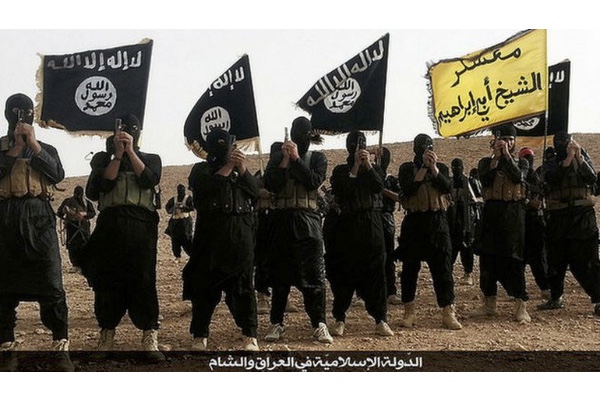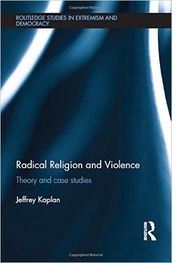ISIS: We Have Seen This Before

"Islamic State (IS) insurgents, Anbar Province, Iraq" by Islamic State (IS) - http://www.examiner.com/slideshow/islamic-state-is-isis-isil#slide=1. Licensed under PD-US via Wikipedia.
The Islamic State seems to be nothing if not ambitious … or suicidal. With the end of a busy week of terror and aggression, its leaders have expanded the conflict in which they are at the center from a regional territorial and ethno-religious struggle to a global conflict against the great powers of East and West as well as the normally passive Western democracies in Europe. As American, French and Russian bombs fall on Raqqa and its redoubts in Iraq and Syria, Abu Bakr al-Baghdadi, the charismatic leader (and Mahdi/redeemer?) of the Islamic State can at last rest assured of final victory over the powers of this world. Whether this is suicidal madness or messianic certainty is a question that will soon be resolved by time and events, and perhaps through the will of God. But Baghdadi is no Hitler in a bunker fantasizing of bold counterstrikes with non-existent forces. There is a method to this seeming madness that we have seen before in many times and many places.
 Two millennia ago, a band of Jewish
zealots, the Sicari, formed the first ‘modern’ terrorist group
whose doomed quest to defeat the Roman occupation of the Holy Land
resembles that of the Islamic State of today. Facing imminent defeat,
they withdrew to where they destroyed their remaining provisions in a
futile quest to force God to act. He did not and a mass suicide of
nearly 900 Jews followed.
Two millennia ago, a band of Jewish
zealots, the Sicari, formed the first ‘modern’ terrorist group
whose doomed quest to defeat the Roman occupation of the Holy Land
resembles that of the Islamic State of today. Facing imminent defeat,
they withdrew to where they destroyed their remaining provisions in a
futile quest to force God to act. He did not and a mass suicide of
nearly 900 Jews followed.
The list of enemies amassed by the Islamic State is no less impressive than the overweening power of Rome. All but a handful of Sunnis oppose them but American vacillation means that ISIS faces few armed ‘democratic’ opponents. Rising tensions with al-Qaeda will surely soon add more Sunni fighters to the enemies list as well. All Shi’ites have good reason to fear ISIS, adding the considerable conventional might of Hezbolah and Iranian Revolutionary Guards, the theoretical Iraqi Army and the very real welter of Iraqi Shi’ite militias to the list of armed foes. Hezbolah, fresh from its impressive showing against Israel, was primarily responsible for halting the ISIS tide at the gates of Damascus. Kurdish fighters have had some successes as well. Add in unwilling Syrian draftees and very willing Syrian Alawites and ISIS is openly at war with the Islamic world.
US policy has been anything but consistent, but American dollars, missiles, bombs, training, and intelligence remains at the heart of opposition to ISIS. Russia, has taken time from its primary project of reigniting the Cold War to bomb ISIS and other enemies of the Assad regime. The bombing of a Russian airliner and the Turkish shoot down of a Russian fighter bodes a much deeper involvement. The French response to the Paris attacks may include a call for European collective defense under NATO’s Article Five and that may leave the US on the sidelines. But it is the flood of refugees that threaten to engulf the European Union—especially Germany and Sweden—which makes a collective response feasible.
As if this were not enough, the Islamic State’s execution of Chinese hostages may very well bring China into the fray. China’s concept of terrorism is very different from that of the West, but its One Belt One Road policy brings China into direct contact with the area claimed by ISIS. The siren song of ISIS has found resonance among Uyghurs in Xinjiang province but rejection by the Hui in the Northwestern provinces. The global opposition to ISIS offers the Chinese a much sought after path to involvement in the global War on Terror on their own terms.
Clearly, the Islamic State now stands against the powers of this world as surely as did the Sicari two millennia ago. Like the Sicari and Second temple Judaism, this existential crisis fits well into the Islamic End of the World drama. When all seems lost, when the Dajjal (antichrist figure) appears triumphant and the faithful stand alone against a fallen world, only then will God act to bring an end to history. He will send the Mahdi, with Jesus at his side, to assure that the forces of good will be triumphant. The living and the dead will be judged and a perfect world established. This has been the Call (dawa) of Dabiq, the Islamic State’s journal from its first issue and the apocalyptic strain of those pages has become increasingly shrill.
A final, apocalyptic confrontation with the world is from the perspective of the Islamic State its best, and only, hope. Their recent actions suggest that they believe that the End is imminent and that if they can but stay the course they will emerge triumphant.
